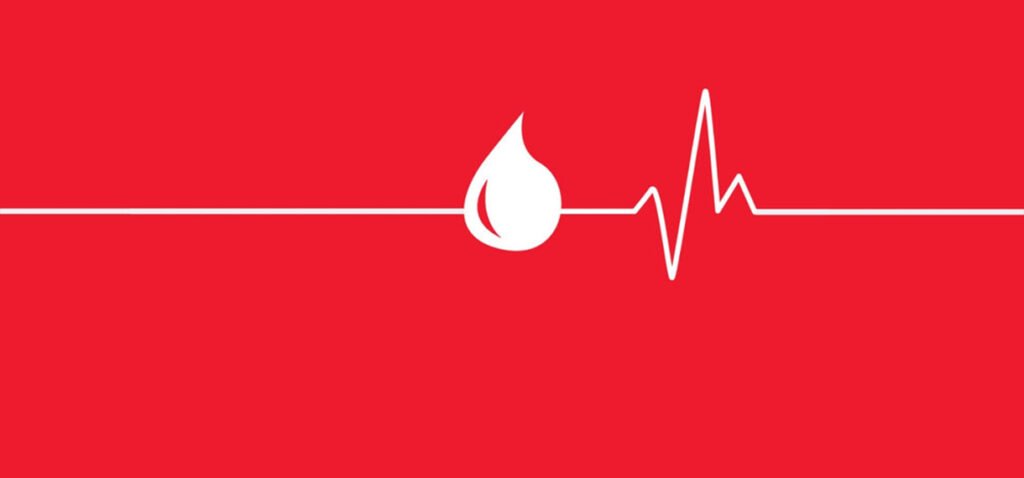
रक्त बंधन
(आंजना समाजसेवा हेल्पलाइन की एक पवित्र पहल)
“किसी गंभीर बीमारी से ग्रस्त मरीज़ के लिए रक्तदान में लगने वाला कम समय जीवन भर के लिए बहुत मायने रखता है। हम योग्य रक्तदाताओं से आग्रह करते हैं कि वे रक्तदान के निस्वार्थ कार्य में हमारे साथ जुड़ें।”
रक्त के प्रकार क्या हैं?
रक्त प्रकार एक वर्गीकरण प्रणाली है जो स्वास्थ्य सेवा प्रदाताओं को यह निर्धारित करने की अनुमति देती है कि आपका रक्त किसी और के रक्त के साथ संगत है या असंगत। चार मुख्य रक्त प्रकार हैं: A, B, AB और O। रक्त बैंक विशेषज्ञ आपके लाल रक्त कोशिकाओं पर एंटीजन A या B के आधार पर आपके रक्त प्रकार का निर्धारण करते हैं। वे Rh कारक नामक एक प्रोटीन की भी जांच करते हैं। यदि आपके पास यह प्रोटीन है तो वे आपके रक्त प्रकार को पॉजिटिव (+) के रूप में वर्गीकृत करते हैं और यदि आपके पास यह प्रोटीन नहीं है तो नेगेटिव (-) के रूप में वर्गीकृत करते हैं।
इस प्रकार आठ सामान्य रक्त प्रकार बनते हैं:
A पॉजिटिव (A+)।
A नेगेटिव (A-)।
B पॉजिटिव (B+)।
B नेगेटिव (B-)।
AB पॉजिटिव (AB+)।
AB नेगेटिव (AB-)।
O पॉजिटिव (O+)।
O नेगेटिव (O-)।
रक्त प्रकारों के बारे में जानने से स्वास्थ्य सेवा प्रदाता रक्त आधान के दौरान दान किए गए रक्त को एक व्यक्ति से दूसरे व्यक्ति में सुरक्षित रूप से स्थानांतरित कर सकते हैं। अंग प्रत्यारोपण के लिए रक्त प्रकारों का भी संगत होना आवश्यक है।
रक्त प्रकार का निर्धारण कैसे होता है?
रक्त बैंक विशेषज्ञ आपके लाल रक्त कोशिकाओं पर मौजूद विशिष्ट एंटीजन के आधार पर रक्त प्रकार निर्धारित करते हैं। एंटीजन एक ऐसा पदार्थ है जो आपके शरीर की प्रतिरक्षा प्रणाली को प्रतिक्रिया करने पर मजबूर कर सकता है। एंटीजन को एक मार्कर (नामपट्टी की तरह) के रूप में समझें जो आपके शरीर में किसी पदार्थ की पहचान करता है कि वह संबंधित है या नहीं।
यदि आपकी प्रतिरक्षा प्रणाली दान किए गए रक्त में मौजूद एंटीजन को संबंधित मानती है, तो आपका रक्त प्रकार किसी और के रक्त प्रकार के साथ संगत है।
रक्त प्रकार का क्या अर्थ है?
“रक्त प्रकार” शब्द सुनते ही ज़्यादातर लोगों के मन में A, B, AB और O आते हैं। ये अक्षर रक्त प्रकारों को इस आधार पर वर्गीकृत करते हैं कि लाल रक्त कोशिकाओं में A प्रतिजन है या B प्रतिजन। इसे ABO प्रणाली कहते हैं।
प्रकार A: लाल रक्त कोशिकाओं में A प्रतिजन होता है।
प्रकार B: लाल रक्त कोशिकाओं में B प्रतिजन होता है।
प्रकार AB: लाल रक्त कोशिकाओं में A और B दोनों प्रतिजन होते हैं।
प्रकार O: लाल रक्त कोशिकाओं में न तो A और न ही B प्रतिजन होते हैं।
रक्त प्रकार या तो “धनात्मक” या “ऋणात्मक” होते हैं, जो Rh कारक के D प्रतिजन, जो एक अन्य सूचक है, की अनुपस्थिति या उपस्थिति पर निर्भर करता है। इसे Rh प्रणाली कहते हैं। RhD धनात्मक होना, RhD ऋणात्मक होने से ज़्यादा आम है।
धनात्मक (+): लाल रक्त कोशिकाओं में RhD प्रतिजन होता है।
ऋणात्मक (-): लाल रक्त कोशिकाओं में RhD प्रतिजन नहीं होता है।
विभिन्न रक्त प्रकार क्या हैं?
ABO और Rh रक्त समूह प्रणालियों में आठ रक्त प्रकार शामिल हैं: A पॉजिटिव (A+), A नेगेटिव (A-), B पॉजिटिव (B+), B नेगेटिव (B-), AB पॉजिटिव (AB+), AB नेगेटिव (AB-), O पॉजिटिव (O+), O नेगेटिव (O-)।
संयुक्त राज्य अमेरिका में सबसे आम रक्त प्रकार O पॉजिटिव (O+) है।
अमेरिका में सबसे कम आम रक्त प्रकार AB नेगेटिव (AB-) है।
दुर्लभ रक्त प्रकार
ABO प्रणाली के अलावा, 600 से ज़्यादा एंटीजन हैं जो लाल रक्त कोशिकाओं से जुड़ सकते हैं। इन अनोखे एंटीजन से जुड़ी 30 से ज़्यादा विभिन्न रक्त समूह प्रणालियाँ हैं। अन्य रक्त समूह प्रणालियों में शामिल हैं:
डफी रक्त समूह।
K एंटीजन (या केल) समूह।
लूथरन रक्त समूह।
किड रक्त समूह।
ये रक्त समूह दुर्लभ हैं। दुर्लभ रक्त प्रकार की सामान्य परिभाषा यह है कि यह प्रति 1,000 लोगों में 1 या उससे कम की दर से होता है।
दुनिया के सबसे दुर्लभ रक्त प्रकारों में से एक Rh-null है। दुनिया में 50 से भी कम लोगों में यह रक्त प्रकार पाया जाता है। यह इतना दुर्लभ है कि इसे कभी-कभी “गोल्डन ब्लड” भी कहा जाता है।
रक्त प्रकार कैसे विरासत में मिलते हैं?
आपको अपना रक्त समूह उसी तरह विरासत में मिलता है जैसे आपको अपनी आँखों का रंग मिलता है—अपने जैविक माता-पिता से। ABO जीन और Rh कारक दोनों ही आपके माता-पिता से आते हैं। कई संभावित संयोजनों के कारण, हो सकता है कि आपका रक्त समूह आपके माता-पिता के समान न हो।
कौन से रक्त प्रकार संगत हैं?
रक्तदान का एक महत्वपूर्ण हिस्सा यह सुनिश्चित करना है कि रक्त प्राप्त करने वाले व्यक्ति (प्राप्तकर्ता) का रक्त समूह रक्तदान करने वाले व्यक्ति (दाता) के रक्त समूह के अनुकूल हो। यदि आप किसी ऐसे दाता से रक्त प्राप्त करते हैं जिसकी रक्त कोशिकाओं में ऐसे एंटीजन होते हैं जिन्हें आपका शरीर पहचान नहीं पाता, तो आपकी प्रतिरक्षा प्रणाली दान की गई लाल रक्त कोशिकाओं पर हमला कर सकती है। इसके परिणाम जानलेवा हो सकते हैं।
आपका रक्त समूह प्रदाता को यह निर्धारित करने में मदद करता है कि आपके लिए कौन से रक्त समूह सुरक्षित हैं। इससे उन्हें यह जानने में मदद मिलती है कि आपके द्वारा दान किया गया रक्त कौन से प्राप्तकर्ता सुरक्षित रूप से प्राप्त कर सकते हैं।
- ए पॉजिटिव: आप ए पॉजिटिव, ए नेगेटिव, ओ पॉजिटिव या ओ नेगेटिव रक्त प्राप्त कर सकते हैं।
- ए नेगेटिव: आप ए नेगेटिव या ओ नेगेटिव रक्त प्राप्त कर सकते हैं।
- बी पॉजिटिव: आप बी पॉजिटिव, बी नेगेटिव, ओ पॉजिटिव या ओ नेगेटिव रक्त प्राप्त कर सकते हैं।
- बी नेगेटिव: आप बी नेगेटिव या ओ नेगेटिव रक्त प्राप्त कर सकते हैं।
- एबी पॉजिटिव: आप कोई भी रक्त समूह प्राप्त कर सकते हैं।
- एबी नेगेटिव: आप एबी नेगेटिव, ए नेगेटिव, बी नेगेटिव या ओ नेगेटिव रक्त प्राप्त कर सकते हैं।
- O पॉजिटिव: आप O पॉजिटिव या O नेगेटिव रक्त प्राप्त कर सकते हैं।
- O नेगेटिव: आप केवल O नेगेटिव रक्त ही प्राप्त कर सकते हैं।
| रक्त प्रकार | रक्त प्रकार जो आप प्राप्त कर सकते हैं | रक्त के वे प्रकार जिन्हें आप दान कर सकते हैं |
|---|---|---|
| A+ | A+, A-, O+, O- | A+, AB+ |
| A- | A-, O- | A-, A+, AB-, AB+ |
| B+ | B+, B-, O+, O- | B+, AB+ |
| B- | B-, O- | B-, B+ AB+, AB- |
| AB+ | सभी रक्त प्रकार (सार्वभौमिक प्राप्तकर्ता) | AB+ |
| AB- | AB-, A-, B-, O- | AB-, AB+ |
| O+ | O+, O- | O+, A+, B+, AB+ |
| O- | O- | सभी रक्त प्रकार (सार्वभौमिक दाता) |
ध्यान दें कि यह मान लिया गया है कि सभी कम प्रचलित गैर-एबीओ रक्त समूह प्रतिजन प्रणालियां भी संगत हैं।
सार्वभौमिक दाता
O नेगेटिव (O-) रक्त समूह सार्वभौमिक दाता है। इसका मतलब है कि किसी भी अन्य रक्त समूह वाला व्यक्ति सुरक्षित रूप से आपका रक्त प्राप्त कर सकता है। इसमें ऐसे कोई एंटीजन मार्कर नहीं होते हैं जिन्हें अन्य रक्त समूह अनुपयुक्त मानते हैं। प्रदाता O नेगेटिव रक्त समूह का उपयोग सबसे अधिक आपात स्थिति में करते हैं जब किसी को तुरंत रक्त की आवश्यकता होती है।
प्रदाता प्लाज्मा दान के लिए रक्त समूह की अनुकूलता निर्धारित करने के लिए विभिन्न मार्करों को देखते हैं। प्लाज्मा रक्त का तरल भाग है। सार्वभौमिक प्लाज्मा दाता AB प्रकार का होता है।
सार्वभौमिक प्राप्तकर्ता
AB पॉजिटिव (AB+) रक्त समूह सार्वभौमिक प्राप्तकर्ता है। आप किसी भी अन्य रक्त समूह से सुरक्षित रूप से रक्त प्राप्त कर सकते हैं। आपका रक्त सभी संभावित प्रतिजनों को सुरक्षित मानता है, इसलिए आपकी प्रतिरक्षा प्रणाली उन पर हमला नहीं करती।
आप अपना रक्त समूह कैसे पता कर सकते हैं?
आप अपने चिकित्सक से पूछ सकते हैं। हो सकता है कि उनके पास आपका रक्त समूह रिकॉर्ड में हो। एक और तरीका, जो आपके और दूसरों के लिए मददगार होगा, वह है अगर आप योग्य हों तो स्वेच्छा से रक्तदान करना। आप अपना रक्त समूह जानने के लिए घर पर ही रक्त परीक्षण किट भी खरीद सकते हैं।
रक्त बैंक विशेषज्ञ रक्त समूहन का उपयोग करके यह निर्धारित करते हैं कि आपकी लाल रक्त कोशिकाओं में कौन से एंटीजन हैं। वे आपके रक्त के नमूने को उन एंटीबॉडी के साथ मिलाते हैं जो एंटीजन A या B पर हमला करते हैं। एंटीबॉडी आपके शरीर में मौजूद एक प्रोटीन होता है जो उन पदार्थों पर हमला करता है जो आपके लिए उपयुक्त नहीं हैं, जैसे कि अपरिचित एंटीजन।
